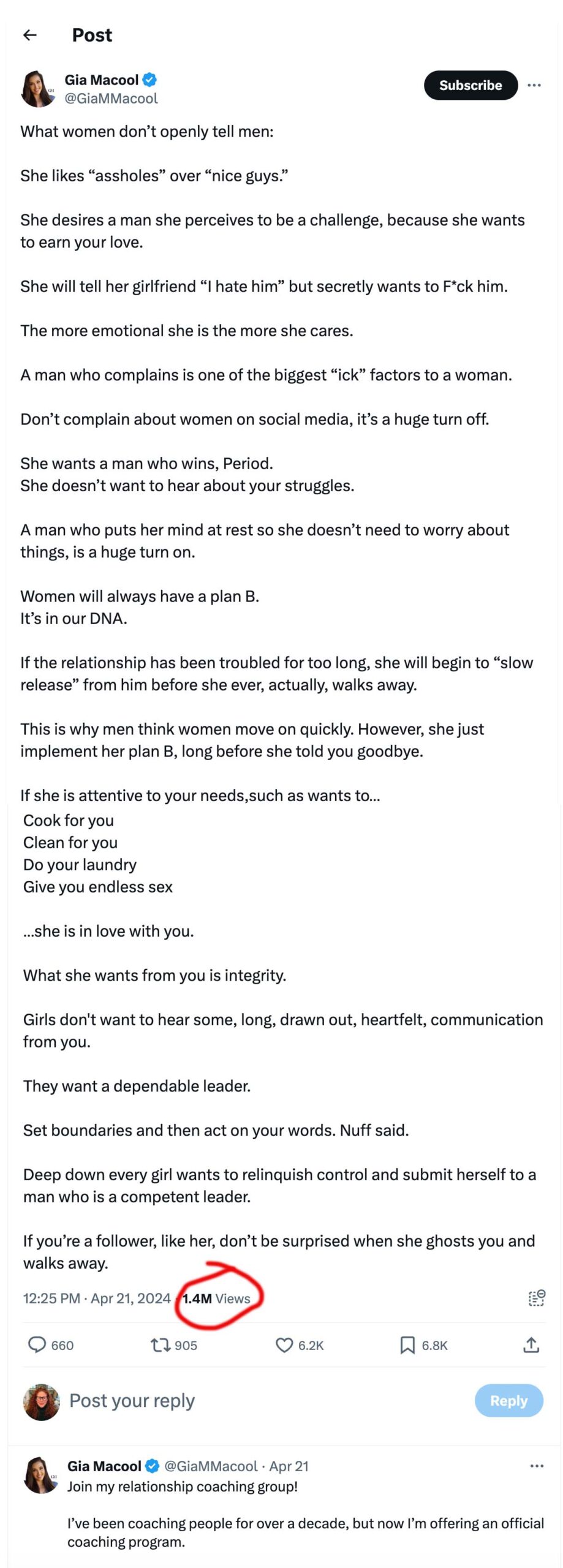 The Narcissistic Woman’s Relationship Manifesto, Part 1 is the latest contender to enter the Shrink4Men WTAF Relationship Advice Thunderdome. The author is yet another self-proclaimed Internet relationship expert who may or may not have legitimate (i.e., a graduate psychology degree and supervised clinical training) credentials.
The Narcissistic Woman’s Relationship Manifesto, Part 1 is the latest contender to enter the Shrink4Men WTAF Relationship Advice Thunderdome. The author is yet another self-proclaimed Internet relationship expert who may or may not have legitimate (i.e., a graduate psychology degree and supervised clinical training) credentials.
Previous contenders include the Love Her Harder lady, the Emotional Labor lady and the Don’t Call your Ex Crazy guy. All three of these individuals have also been the subjects of Shrink4Men articles and videos (here, here and here).
Recently, a client shared a Twitter post from Gia Macool, which is the subject of this three-part series. He emailed the link, so we could discuss it in session. Prior to reading her tweet, he was already feeling disheartened and discouraged by his dating app experiences. Macool’s treatise didn’t help. In fact, it led him to feel even more disheartened and discouraged. As in, if what Macool claims about women and relationships is true, maybe he should give up on dating altogether.
Full-disclosure: I’d never heard of Macool until my client shared her tweet. She claims to know what women really think and feel about men and what women secretly want from men in relationships. Her “credentials” are “Relationship Coach, Author, Fitness Influencer and Public Speaker.” She physically resembles a Kardashian, for whatever that’s worth. And, according to my client, Macool also posts a lot of bikini selfies on her social media. [When I publish a video of version of this, yes, there will be a hard eye roll here.]
Perhaps Macool doesn’t actually believe her public advice. Maybe she tweets provocative posts for the Likes and the money. Or, perhaps her views truly reflect her own personal relationships and how she advises her coaching clients. I don’t know. Nevertheless, here is her tweet: Okay, let’s dissect this tweet viewed by 1.4 million people and Twitter bots.
Okay, let’s dissect this tweet viewed by 1.4 million people and Twitter bots.
“She likes assholes over nice guys.”
Fellas, this is a red flag. Conversely, men who like crazy women and find emotionally mature and stable women “boring” is also a red flag. These are opposite-sides-of-the-same-coin red flags for men and women who seek a healthy relationship partner. To be blunt, men and women who prefer “assholes,” “Crazies” and/or “crazy assholes” to emotionally stable, kind adults have issues.
Either these individuals are personality disordered, in which case, RUN. Or, they’re codependents who haven’t dealt with their codependency issues yet. Personality disordered people usually target “nice” guys/gals, and then abuse the hell out of them.
Narcissists, borderlines and histrionics typically marry the nice guy or gal, and then become bored with them. Once boredom begins, contempt and devaluation follow. It’s pretty common for a NPD, BPD or HPD to cheat on the nice partner with someone who’s an asshole like them. Alternately, they find another codependent nice guy/gal. They dupe codependent fixers into believing they’re rescuing them from an abusive partner (i.e., the Karpman Drama Triangle).
Codependents, on the other hand, are often more attracted to disordered and/or mentally ill partners due to repetition compulsion. Codependency usually develops in families with at least one personality disordered, addicted and/or mentally ill parent. Adult partners with similar issues feel familiar and, therefore, more attractive and exciting to codependents.
Codependents who haven’t identified their destructive relationship patterns and begun to work on their issues aren’t healthy relationship candidates either. They confuse being needed with being loved. Therefore, healthier men and women don’t appeal to them because healthy adults don’t need to be saved, rescued or fixed.
“She desires a man she perceives to be a challenge, because she wants to earn your love.”
At the risk of repeating myself, red flag. This one is also true of emotionally unhealthy women and men. Whether the cause is codependency or a personality disorder; it’s dysfunctional. Many of my clients who struggle with codependency have this faulty relationship belief.
For example, they don’t believe they can be loved simply for being who they are. Or, that they have to prove themselves worthy of love. These beliefs typically arise in families in which a child is parentified. Meaning, a child becomes an emotional or physical caretaker of a parent(s). In other words, a child’s worth and identity develops around how well they caretake the parent and how much abuse they can tolerate from the parent. This also becomes the child’s definition of love. As adults, this transfers to their partners. It’s how codependents are made.
For these individuals, when love seems “too easily” offered (i.e., you don’t have to jump through an endless series of hoops and no-win situations), it doesn’t feel like love. At least not based on their childhood experience of love, which was one-sided and transactional.
Additionally, “proving your love” is a common theme in relationships with narcissists, borderlines and histrionics. Ultimately, you can’t prove your love to someone who isn’t capable of love. Remember, proving your love to a BPD, NPD or HPD means never holding them accountable and allowing yourself to be used, manipulated and abused.
“She will tell her girlfriend “I hate him” but secretly wants to F*ck him.”
Yep, you guessed it — red flag. This one seems like an example of a narcissistic injury response. Meaning, a NPD/BPD woman feels rejected, and then hates the person who rejected her. These individuals cannot process rejection and loss. They lack the psychological capacity to do so. Instead, they react in ways that are destructive to themselves and others.
You don’t have to be a narcissist to experience a narcissistic injury. People who aren’t disordered or codependent express disappointment, hurt and vulnerability when they feel rejected. Codependents usually don’t handle rejection well either. It’s common for codependents to go into a depression spiral in which unresolved childhood feelings of being unlovable or unworthy arise.
When a NPD/BPD experiences a narcissistic injury, they go into a narcissistic or borderline rage and attack. Therefore, wanting to have sex with the object of hate isn’t about desire and unrequited love. It’s a psychological defense to the feelings of inferiority the rejection elicits.
Over the years, I’ve had a handful of narcissistic clients. These men saw themselves as victims of borderline women. They weren’t hurt, but angry. “How dare that BPD bleep treat me like that after everything I did for her?!” These men weren’t interested in grieving and healing. They wanted revenge. Their plan was to woo their respective BPD exes back, flip the script and dump them after making them suffer.
These weren’t the fleeting revenge fantasies that some hurting victims of NPD/BPD partners experience during the anger stage of grief. These NPD men were intent on carrying out their revenge plots and would not be dissuaded. Like I said, this is nuts, so don’t waste too much energy trying to understand it.
“The more emotional she is the more she cares.”
First, LOLOLOLOLOLOLOLOLOLOLOLOLOLOLOLOLOLOOLOLOLOLOLOLOL! Seriously, I literally laughed out loud when my client got to this nugget. In fact, I’m still chuckling. Second, this is just wrong.
I suspect what Macool calls “emotional,” is actually emotional dysregulation. From the Cleveland Clinic:
Emotional dysregulation is a mental health symptom that involves trouble controlling your emotions and how you act on those feelings. To those around you, your emotions and reactions will seem out of proportion compared to what you’re reacting to. It’s similar and closely linked to executive dysfunction.
When you manage or regulate your emotions, you can steer and direct how you feel and react. Most people learn how to do this as children and develop it as they get older. It’s also a key part of being adaptable or resilient to challenges, learning and more…
…An example of learned emotional regulation is how children eventually outgrow temper tantrums. During childhood, tantrums are normal and an expected part of your child’s development. As children get older, they generally learn how to manage their emotions. That’s why tantrums become less frequent and eventually stop…
In adults, emotional dysregulation is a personality disorder trait — particularly in BPD people. It’s also a trait of people who are neurodivergent, have trauma conditions like PTSD, conduct disorders, bipolar disorder, obsessive-compulsive disorders and people with brain damage and dementia.
Emotional dysregulation is not a measure of how much a woman cares about you. Nor is it a measure of how much an emotional dysregulation-prone man cares about you. It is a measure of serious mental illness or characterological pathology.
“A man who complains is one of the biggest “ick” factors to a woman.”
People — men and women — who chronically complain and whine can be annoying, so fair enough. But taken in context with Macool’s other relationship turn-offs, this could be interpreted as a lack of empathy. And a lack of empathy is yet another big relationship red flag.
It’s impossible to have healthy, two-way street relationships built upon mutual respect and caring without integrity, empathy, emotional maturity, accountability and a conscience. If any of these characteristics are absent in either partner, it isn’t going to work. Or rather, it won’t work well even if the relationship lasts for decades.
“Don’t complain about women on social media, it’s a huge turn off.”
This one gets another LOLOLOLOLOLOLOLOLOLOLOLOLOLOLOLOLOLOLOLOL! Seriously, lady? To quote myself, projection isn’t just a room in the back of a theater. Good grief.
Social media is rife with memes, articles and videos with women complaining about men and vice versa. There are female social media influencers/multilevel marketers who profit from complaining about men. Many of these women have made cottage industries from complaining about their partners and exes, not just men in general. Women and men who profit from claiming to be victims of an ex and smear them for money and attention is a big red flag.
So, if a prospective mate — man or woman — habitually slags off an ex (or exes) and routinely posts about how awful all women or all men are, you may want to reconsider a relationship with them. Eventually, once the devaluation stage begins, you will be smeared as the new asshole ex.
Sometimes you find good information in the least likely of places:
Hannah Gadsby is an Australian comedian whose comedy I don’t find especially funny. However, in her Netflix special, Nanette (2018), she makes an astute observation. During her Pablo Picasso rant, Gadsby says:
…Picasso suffered the mental illness of misogyny… Is misogyny a mental illness? Yeah. Yeah, it is! Especially if you’re a heterosexual man. Because if you hate what you desire, do you know what that is? Fucking tense! Sort your shit out…
First, if misogyny is a mental illness, then so is misandry (I’m looking at you, Hannah). By the way, misogyny isn’t listed as a mental disorder in the DSM. Nevertheless, Gadsby makes an excellent point. If you hate what you desire, it’s a problem. A great big one.
If you’re a man who hates, fears and mistrusts women, yet desires a relationship with a woman, it’s a guaranteed path to misery and madness. Conversely, the same is 100% true if you’re a woman who hates, fears and mistrusts men, yet desires a relationship with a man. This is also a guaranteed path to misery and madness. Gadsby is right about this even if she only holds men to account. If you hate and fear who you desire, you need to sort that shit out.
Concluding the Narcissistic Woman’s Relationship Manifesto, Part 1.
The Narcissistic Woman’s Relationship Manifesto is a three-part series. Parts two and three will continue to dissect Macool’s “truth.” Not the truth; her truth. Macool’s tweet unwittingly describes how unhealthy and likely personality disordered women view men and relationships. In this respect, she provides a great red flag list. You won’t be able to have a healthy relationship with anyone who holds the attitudes and sentiments Macool describes in her tweet.
In other words, if a woman or man you’re dating expresses similar beliefs or is a Macool fan who sees her as some kind of relationship guru — keep looking! It’s akin to discovering your date believes Amber Heard is a victim. Macool offers useful information if you choose to heed it, albeit, not in the way she intended.
 Counseling, Consulting and Coaching with Dr. Tara J. Palmatier, PsyD
Counseling, Consulting and Coaching with Dr. Tara J. Palmatier, PsyD
Dr. Tara J. Palmatier, PsyD helps individuals with relationship and codependency issues via telephone or Skype. For over a decade, she has specialized in helping men and women break free of abusive relationships, cope with the stress of ongoing abuse and heal from the trauma. She combines practical advice, emotional support and goal-oriented outcomes. If you’d like to work with Dr. Palmatier, please visit the Schedule a Session page or you can email her directly at shrink4men@gmail.com.
 Want to Say Goodbye to Crazy? Buy it HERE.
Want to Say Goodbye to Crazy? Buy it HERE.
Leave a Reply
You must be logged in to post a comment.